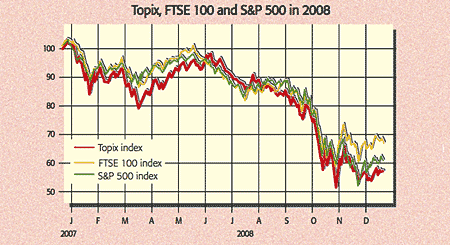Get the latest financial news, insights and expert analysis from our award-winning MoneyWeek team, to help you understand what really matters when it comes to your finances.
You are now subscribed
Your newsletter sign-up was successful
Want to add more newsletters?

Twice daily
MoneyWeek
Get the latest financial news, insights and expert analysis from our award-winning MoneyWeek team, to help you understand what really matters when it comes to your finances.

Four times a week
Look After My Bills
Sign up to our free money-saving newsletter, filled with the latest news and expert advice to help you find the best tips and deals for managing your bills. Start saving today!
"Bail-out" was the word of the year, according to the compilers of the Merriam-Webster dictionary. It was certainly the word on the minds of investors for most of 2008, raising hopes that were usually quickly dashed.
Back at the start of the year, expectations were high that the bull market would resume promptly. Wall Street was unfazed, says Kopin Tan in Barron's; a poll of 12 US strategists revealed a consensus forecast of a 10% rise in the S&P 500 over the year. In Britain, Investment Week's poll of fund managers' year-end targets for the FTSE 100 ranged from 6,400 to a strikingly specific 7,386. But there was already "concrete evidence that the effects of the credit crunch were spreading to the wider economy", as Alan Clarke of BNP Paribas put it. As the fundamentals deteriorated, earnings began to fall and the frozen credit markets showed no signs of thawing, stocks continued to tick down.

Markets went "completely insane", says Edmund Shing of BNP Paribas, with record drops amid a flurry of other bank bail-outs and mergers, combined with forced selling by hedge funds. At their October-November lows, the S&P 500 had returned to levels last seen in 1997 and Japan's Topix was showing no gain since 1983.
MoneyWeek
Subscribe to MoneyWeek today and get your first six magazine issues absolutely FREE

Sign up to Money Morning
Don't miss the latest investment and personal finances news, market analysis, plus money-saving tips with our free twice-daily newsletter
Don't miss the latest investment and personal finances news, market analysis, plus money-saving tips with our free twice-daily newsletter
Get the latest financial news, insights and expert analysis from our award-winning MoneyWeek team, to help you understand what really matters when it comes to your finances.
MoneyWeek is written by a team of experienced and award-winning journalists, plus expert columnists. As well as daily digital news and features, MoneyWeek also publishes a weekly magazine, covering investing and personal finance. From share tips, pensions, gold to practical investment tips - we provide a round-up to help you make money and keep it.
-
 How a ‘great view’ from your home can boost its value by 35%
How a ‘great view’ from your home can boost its value by 35%A house that comes with a picturesque backdrop could add tens of thousands of pounds to its asking price – but how does each region compare?
-
 What is a care fees annuity and how much does it cost?
What is a care fees annuity and how much does it cost?How we will be cared for in our later years – and how much we are willing to pay for it – are conversations best had as early as possible. One option to cover the cost is a care fees annuity. We look at the pros and cons.

